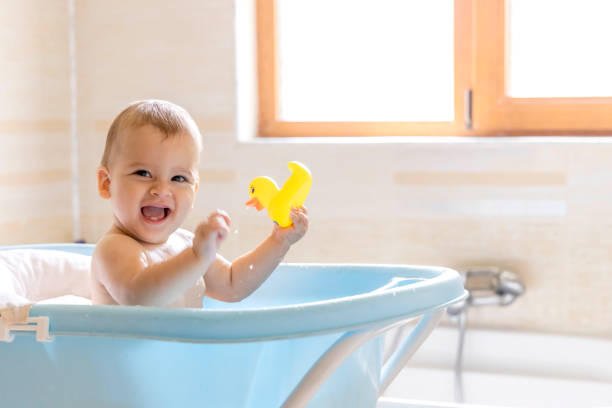
Welcoming a newborn into your life is magical but also overwhelming. From feeding to sleep schedules, newborn care at home requires patience, love, and consistency. Here’s your easy-to-follow guide to help you care for your baby confidently.
Create a Safe and Comfortable Sleeping Environmen
Newborns sleep a lot—up to 16–18 hours a day. Set up a safe sleeping space:
- Use a firm, flat mattress in a crib or bassinet.
- Avoid pillows, soft toys, and blankets in the crib.
- Always place your baby on their back to sleep.
Keep the room cool and quiet to help your baby sleep better.
Master the Basics of Newborn Feeding
Whether breastfeeding or formula-feeding, babies need to eat every 2–3 hours. Watch for hunger cues like:
- Lip-smacking
- Rooting reflex
- Fidgeting or hand-to-mouth movements
Tips for feeding success:
- Hold your baby upright while feeding.
- Burp after each feed to avoid gas.
- Keep bottles and nipples clean and sterilized.
Stay hydrated and well-nourished if you’re breastfeeding.
Prioritize Cleanliness and Hygiene
Cleanliness protects your baby from infections.
- Wash your hands before touching the baby.
- Sterilize feeding equipment daily.
- Bathe your newborn two to three times a week.
Use a mild baby soap and warm water. Clean their face, neck folds, and diaper area daily.
Diapering Essentials: Stay Ahead of Rashes
Newborns go through 8–12 diapers a day. Always:
- Change diapers immediately after soiling.
- Clean the area with fragrance-free wipes or warm water.
- Let the skin dry completely before putting on a fresh diaper.
- Use diaper rash cream if redness appears.
Allow some diaper-free time daily for better air circulation.
Understand and Soothe Newborn Crying
Crying is how babies communicate. They may cry when:
- Hungry
- Tired
- Wet or dirty
- Overstimulated
- In need of cuddles
Try swaddling, rocking, or gentle shushing sounds. Offer a pacifier if needed. Keep calm—it’s okay to take a break.
Umbilical Cord Care is Crucial
Keep the stump dry and clean until it falls off (usually within 2 weeks).
- Clean gently with water; avoid rubbing alcohol.
- Fold diapers below the cord area.
- Watch for signs of infection—redness, pus, or swelling.
Contact your pediatrician if the stump smells foul or bleeds excessively.
Monitor Baby’s Health and Growth
Newborns should visit a pediatrician regularly. Monitor:
- Weight gain
- Feeding habits
- Sleep patterns
- Bowel movements
Track developmental milestones. Trust your instincts—if something feels off, seek help.
Establish a Gentle Routine
Though babies have irregular patterns, consistency helps.
- Create a calming bedtime routine.
- Play soft music or white noise.
- Offer tummy time during the day.
- Limit overstimulation with lights and noise.
Routine provides comfort and security to your baby.
Take Care of Yourself Too
A healthy parent means a happy baby.
- Sleep when your baby sleeps.
- Accept help from family and friends.
- Eat balanced meals and stay hydrated.
- Don’t hesitate to talk to a counselor if feeling overwhelmed.
Your well-being is just as important as your baby’s.
Final Thoughts
Caring for a newborn is a learning journey. Be patient with yourself. Trust the process. Enjoy the snuggles, the soft cries, and those unforgettable firsts. You’ve got this!





I was just searching for this information for some time. After six hours of continuous Googleing, finally I got it in your website. I wonder what’s the lack of Google strategy that don’t rank this type of informative websites in top of the list. Usually the top web sites are full of garbage.
Great amazing things here. I?¦m very happy to peer your post. Thanks so much and i’m taking a look forward to contact you. Will you kindly drop me a e-mail?
Have you ever considered writing an ebook or guest authoring on other blogs? I have a blog based on the same subjects you discuss and would love to have you share some stories/information. I know my subscribers would enjoy your work. If you are even remotely interested, feel free to shoot me an e mail.
Really excellent information can be found on site. “Search others for their virtues, thyself for thy vices.” by Benjamin Franklin.
I got what you mean ,saved to bookmarks, very decent site.
Great – I should definitely pronounce, impressed with your web site. I had no trouble navigating through all tabs and related info ended up being truly easy to do to access. I recently found what I hoped for before you know it at all. Reasonably unusual. Is likely to appreciate it for those who add forums or something, web site theme . a tones way for your client to communicate. Nice task.
Can I simply say what a aid to find someone who really is aware of what theyre speaking about on the internet. You undoubtedly know the way to bring a problem to gentle and make it important. More people must learn this and perceive this aspect of the story. I cant consider youre not more standard since you definitely have the gift.
Very excellent info can be found on weblog. “Education is what most receive, many pass on, and few possess.” by Karl Kraus.
It?¦s actually a great and helpful piece of info. I am satisfied that you just shared this helpful information with us. Please stay us up to date like this. Thanks for sharing.
Your home is valueble for me. Thanks!…